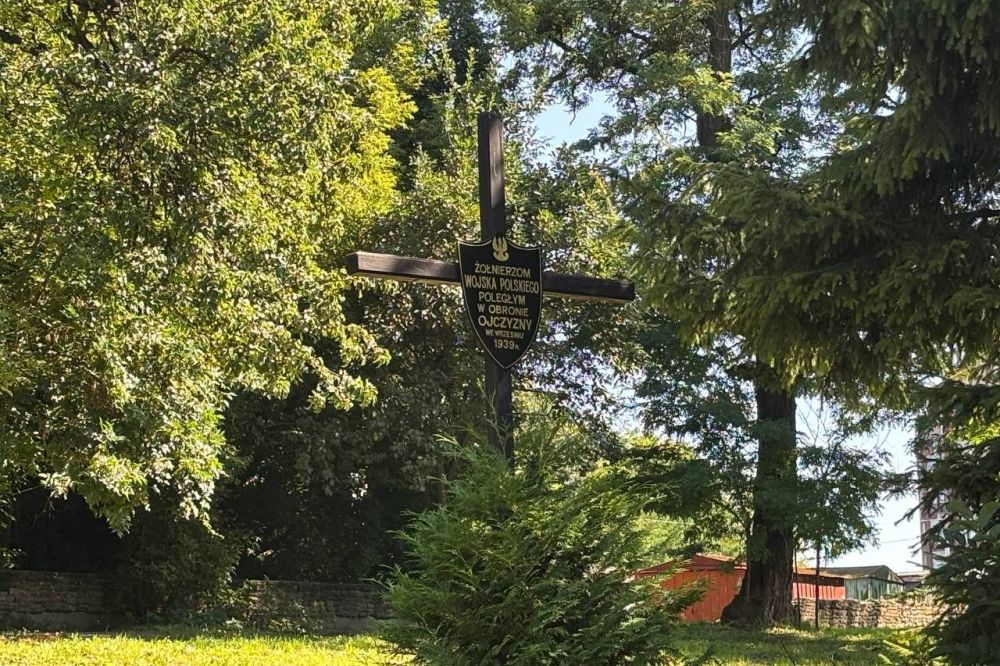Keep our news free from ads and paywalls by making a donation to support our work!

Notes from Poland is run by a small editorial team and is published by an independent, non-profit foundation that is funded through donations from our readers. We cannot do what we do without your support.
A team of Ukrainian and Polish researchers has started work to find and exhume the remains of Polish soldiers killed in September 1939 while defending the city of Lviv (now in Ukraine, but then known as Lwów and part of Poland) during the invasions by Nazi Germany and the Soviet Union at the start of World War Two.
The development adds to further recent moves towards reconciliation between Ukraine and Poland over the issue of exhuming victims of the war, which has long been a point of contention between two otherwise close allies.
У Львові розпочали ексгумацію солдатів Війська Польського, загиблих під час Другої світової війни.
Ексгумацію проводять на території колишнього цвинтаря на Збоїщах, роботи орієнтовно триватимуть до 30 серпня. pic.twitter.com/2ID50JZFDd
— ҐРУНТ (@grntmedia) August 4, 2025
On Monday, Ukraine’s culture ministry announced that “a Ukrainian-Polish team has begun search and exhumation work with the aim of reburying the remains of Polish Army soldiers”. The work is expected to continue until 30 August.
“The soldiers died in 1939 while defending Lviv from the German army,” they added. Polish broadcaster RMF notes that, in September 1939, units commanded by Colonel Stanisław Maczek, a renowned Polish tank commander, fought fierce battles with the invading Wehrmacht in the area.
In 2019, Poland’s Institute of National Remembrance (IPN) and the Ukrainian Memory Association conducted searches at the site of a former cemetery there. They found a mass grave of Polish soldiers from September 1939, whom they identified by fragments of uniforms, gas masks and coins.
Following the findings, the IPN issued a request to Ukraine in 2020 for the exhumation of the remains of Polish soldiers in order to grant them a dignified burial. However, Ukraine initially declined it.
That decision came amid a broader Ukrainian moratorium on the exhumation of Polish remains amid tensions over wartime massacres of ethnic Poles by Ukrainian nationalists and over Ukrainian sites of commemoration in Poland.
However, in a major breakthrough, Ukraine this year allowed exhumations to resume, beginning with the remains of Polish massacre victims in the former village of Puzhnyky (Puźniki in Polish). In June, Kyiv also gave the green light for the exhumations in Lviv to take place.
Poland and Ukraine have granted one another permission to conduct exhumations of historical war victims on their respective territories.
Kyiv hailed the development as a further example of the "constructive work of Ukraine and Poland on historical issues" https://t.co/F0yN3eRl3G
— Notes from Poland 🇵🇱 (@notesfrompoland) June 12, 2025
In today’s announcement, Ukrainian deputy culture minister Andrii Nadzhos called the latest exhumations “an example of how joint efforts help both nations restore historical memory and justice”.
“The memory of the victims of World War II is not only about the past, it is about our current values: dignity, mutual respect, the ability to have dialogue,” he added.
Poland’s foreign minister, Radosław Sikorski, meanwhile, celebrated the development as another example of how exhumations have resumed under the current Polish government after being halted under the former Law and Justice (PiS) administration.
Za PiS ekshumacje wstrzymano, teraz kolejne ruszają. https://t.co/ZrS2dEzmWj
— Radosław Sikorski 🇵🇱🇪🇺 (@sikorskiradek) August 4, 2025
Last month, Poland’s culture ministry announced that the separate exhumations in Puzhnyky had uncovered the remains of at least 42 people. They are believed to be among the victims of the Volhynia massacres, during which Ukrainian nationalists killed around 100,000 ethnic Poles between 1943 and 1945.
That episode continues to cause tension between the two countries. Poland regards the massacres as a genocide but Ukraine rejects the use of that term and commemorates leaders of nationalist organisations that were responsible for the killings.
However, recent years have also seen moves towards reconciliation, including the presidents of Poland and Ukraine, Andrzej Duda and Volodmyr Zelensky, jointly commemorating the massacres in 2023.
Ukraine has criticised plans by Poland to create a "day of remembrance for Polish victims of the genocide" carried out by Ukrainian nationalists during WWII.
Kyiv says the idea “flies in the face of the spirit of good neighbourly relations” https://t.co/zkdebpw1G4
— Notes from Poland 🇵🇱 (@notesfrompoland) June 5, 2025

Notes from Poland is run by a small editorial team and published by an independent, non-profit foundation that is funded through donations from our readers. We cannot do what we do without your support.
Main image credit: Ukrainian culture ministry

Agnieszka Wądołowska is deputy editor-in-chief of Notes from Poland. She is a member of the European Press Prize’s preparatory committee. She was 2022 Fellow at the Entrepreneurial Journalism Creators Program at City University of New York. In 2024, she graduated from the Advanced Leadership Programme for Top Talents at the Center for Leadership. She has previously contributed to Gazeta Wyborcza, Wysokie Obcasy and Duży Format.


















